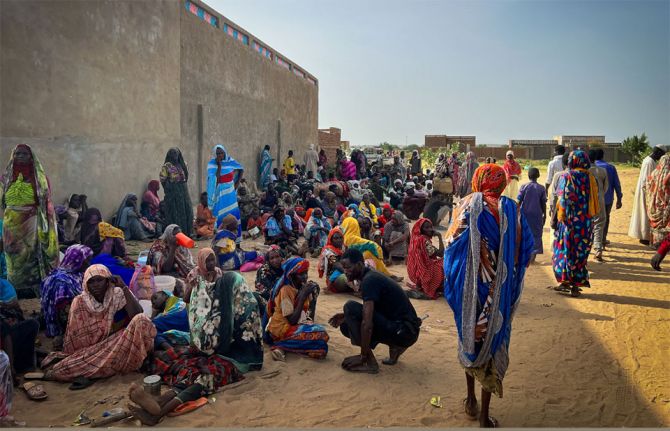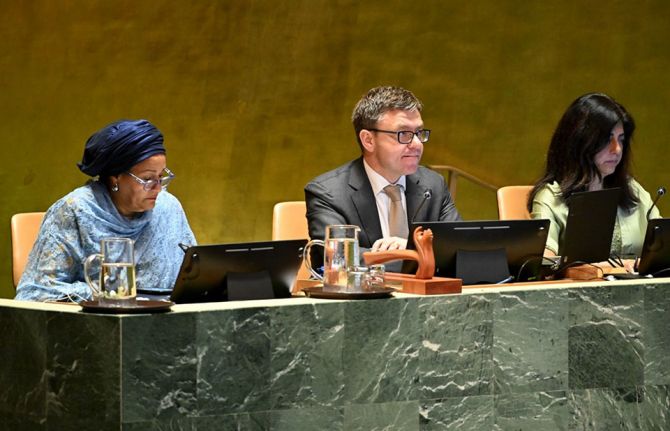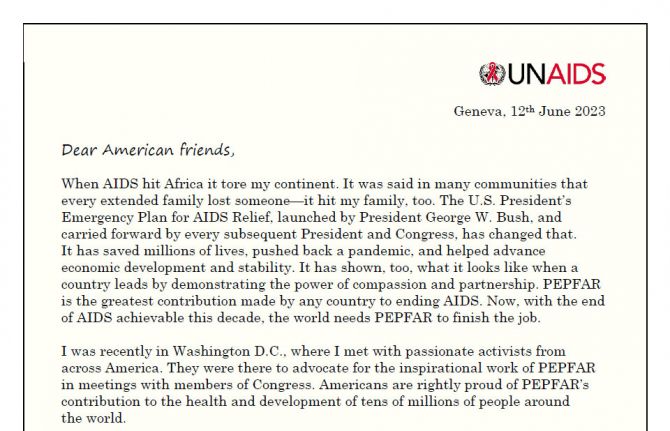
Feature Story
Kenya to adopt comprehensive HIV prevention package for people who inject drugs
23 February 2011
23 February 2011 23 February 2011A version of this story was first published at UNODC.org

The comprehensive HIV prevention package will include access to sterile needles and syringes
Credit: UNAIDS
The Kenyan government is taking an innovative approach to reducing HIV among injecting drug users. In a bold new initiative, the government is set to give drug users free access to HIV prevention and treatment services. Supplies of sterile needles and syringes, substitution treatment, social support and referral to other health services, including antiretroviral therapy, will be available.
In a pilot project, 12 primary health care centres in Mombasa are offering drug dependence treatment and psycho-social support in several communities on an out-patient basis. For the next three months, the Kenya Red Cross will provide support to the Ministry of Health. HIV voluntary counseling and testing are also offered. The Ministry of Medical Services is preparing a rapid capacity building plan and staff will receive additional training in the next few weeks and months.
It is expected that this model will be adopted in other regions.
The action plan to roll out the comprehensive HIV prevention package follows a recent national meeting on people who inject drugs convened by the National AIDS Control Council (NACC). The meeting’s resolutions were also endorsed by Members of Parliament during a subsequent leadership workshop on HIV.
The United Nations is playing a key role in the programme and the UNAIDS family has worked in close partnership with the National AIDS Control Council and many government agencies, to encourage the adoption of this comprehensive HIV prevention package.
The United Nations Office on Drugs and Crime is also joining the government in developing an intensive training programme for 700 health professionals and civil society actors to offer quality services for injecting drug users.
Kenya’s government has recognized the importance of addressing the needs of key populations such as people who inject drugs, sex workers and their clients, men who have sex with men, and people in prisons. This was reinforced by its Modes of Transmission Study published in March 2009 which indicated that such populations accounted for more than a third of all new HIV infections. The adoption of the comprehensive package for HIV prevention among people who inject drugs is seen as a significant step forward.
Related

Feature Story
Breaking the silence: Fact and priorities for the AIDS response in the Middle East and North Africa
21 February 2011
21 February 2011 21 February 2011
Credit: The World Bank
Information about the spread of HIV in the Middle East and North Africa region has been extremely limited, with no real picture of the epidemic emerging. As a major contribution to increasing knowledge of AIDS in the region, the World Bank recently convened a discussion to highlight the first ever comprehensive scientific analysis of the epidemic.
A groundbreaking report, a joint effort involving the World Bank, UNAIDS and the World Health Organization, was the focus of the event at the Bank’s Washington Headquarters. The event on 15 February brought together policy makers from the region, politicians, researchers, civil society actors, and partners. They discussed the findings and implications for prioritizing resources amid the fundamental social and political changes currently affecting the region.
HIV in North Africa and the Middle East
HIV infection has already reached all corners of North Africa and the Middle East. There are substantial differences in the way the virus is spread across the region and various risk contexts are present. The epidemic has become generalized in Djibouti and Sudan, though prevalence in the general population in most other countries is low. The nearly one million people who inject drugs (0.2% of the population), men who have sex with men and their sexual partners, and commercial sex networks are the most impacted by HIV. A significant number of individuals have also contracted the virus while living and working abroad.
Levels of risk behaviour, such as using non-sterile injecting equipment, are high in a number of countries in the region. This confirms the potential for further HIV spread among the key populations.
A number of social challenges, including pervasive stigma, are also facilitating the spread of the virus.
The way forward
The priorities are clear to address the problem of the rising epidemics in the region and it is time for policy makers and partners to take action
Laith J. Abu-Raddad, Assistant Professor of Public Health and Director of the Biostatistics and Biomathematics Research Core at Weill Cornell Medical College in Qatar
Laith J. Abu-Raddad, the report’s main author, who participated in the World Bank discussion, believes that with today’s greater understanding of the epidemic, time is of the essence in building a more meaningful response. “We are no longer groping in the dark on HIV in the region. The data are now available and we have a good understanding of what’s happening with regard to HIV transmission and the populations affected.” He added, “The priorities are clear to address the problem of the rising epidemics in the region and it is time for policy makers and partners to take action.”
Participants at meeting agreed that the current political climate presents a window of opportunity for sustained change. They called on policy makers to focus investment on evidence-informed prevention efforts for key populations to yield long term health and social benefits.
Stigma and discrimination must also be challenged and access to testing, care, and treatment services expanded substantially.
A partnership with civil society, concerned populations and people living with HIV will be the cornerstone of effective implementation. Strengthening grassroots organizations is considered essential for cementing progress made and reaching the most stigmatized and vulnerable.
The report includes data on Afghanistan, Algeria, Bahrain, Djibouti, the Arab Republic of Egypt, the Islamic Republic of Iran, Iraq, Jordan, Kuwait, Lebanon, Libya, Morocco, Oman, Pakistan, Qatar, Saudi Arabia, Somalia, Sudan, the Syrian Arab Republic, Tunisia, the United Arab Emirates, West Bank and Gaza (Occupied Palestinian Territories), and the Republic of Yemen.

Feature Story
UNAIDS applauds Thailand’s successes on AIDS and urges continued leadership through an ‘HIV prevention revolution’
18 February 2011
18 February 2011 18 February 2011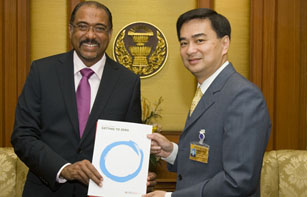
On Thursday, UNAIDS Executive Director Michel Sidibé (left) urged the Prime Minister of Thailand, Abhisit Vejjajiva, to lead an HIV prevention revolution in the Asia region, with the goal of zero new HIV infections, zero discrimination and zero AIDS-related deaths. Credit: UNAIDS/V. Dithajohn
On the final day of an official country visit to Thailand, UNAIDS Executive Director Michel Sidibé praised Thailand’s Prime Minister, Abhisit Vejjajiva, for his leadership and commitment on AIDS in the country and urged Thailand to redouble efforts—and resources—on HIV prevention.
Underlining the country’s current successes, including significant advances in the provision of antiretroviral treatment and increased access to services for the prevention of mother-to-child transmission of HIV, Mr Sidibé urged Thailand to lead an HIV prevention revolution in the Asia region.
Thailand has an outstanding record in the AIDS response which now needs to be taken to the next level
Michel Sidibé, UNAIDS Executive Director
“Thailand has an outstanding record in the AIDS response which now needs to be taken to the next level,” said Mr Sidibé, encouraging Thailand to take the lead and be the first country in the region to make a concrete impact on the vision of zero new HIV infections, zero discrimination and zero AIDS-related deaths.
Thailand is known for its effective, rapid and targeted HIV response. Currently 80% of people in need have access to antiretroviral treatment and nearly 97% of pregnant women living with HIV have access to services to prevent mother-to-child transmission of HIV. The Government of Thailand funds 83% of its national HIV response, but only 14% of the national HIV budget is allocated for HIV prevention.
Prime Minister Abhisit acknowledged that HIV prevention efforts in Thailand need to be rapidly intensified and that they should be clearly focused on key affected populations, such as sex workers, men who have sex with men, and people who inject drugs. He complimented UNAIDS’ bold goal of zero new HIV infections. Stigma and discrimination was highlighted in the meeting as one of the critical barriers in the HIV response, particularly with regard to its impact on people living with HIV and the affected communities. Prime Minister Abhisit also called attention to Thailand’s newly developed harm reduction policy and said that he was taking action to ensure the policy’s implementation across the country, starting in ten provinces.
Underlining his continued commitment to lead on the issue of AIDS, the Prime Minister expressed his interest in playing an active role in the June 2011 UN General Assembly High-Level Meeting on AIDS.

Feature Story
Letter to Partners 2011: UNAIDS Executive Director Michel Sidibé
18 February 2011
18 February 2011 18 February 2011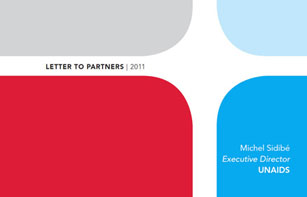
In his 2011 Letter to Partners, Mr Sidibé outlines a set of six new frontiers to move the global AIDS response forward: The democratization of the response; making the law work for not against AIDS; reducing the upward trajectory of programme costs; making funding for AIDS a shared responsibility; making the AIDS movement a bridge to development; and fostering scientific innovation for HIV prevention and treatment.
According to Mr Sidibé, each of the new frontiers supports the other, and he cautions that a singular advancement in any one sector alone will not be sufficient to move the entire global AIDS response forward.
This Letter to Partners coincides with the 30 years of the AIDS epidemic, the 10th anniversary of the 2001 Declaration of Commitment on HIV/AIDS and five years since the world committed to achieve universal access to HIV prevention, treatment, care and support.
Together, we can make this the defining decade, the decade that signals the beginning of the end of AIDS
Michel Sidibé, UNAIDS Executive Director
“This year we have an historic opportunity to build on and improve the performance of the last three decades,” said Sidibé. “Together, we can make this the defining decade, the decade that signals the beginning of the end of AIDS,” he added in anticipation of the June 2011 General Assembly High Level Meeting on AIDS that will bring together world leaders to renew hope and re-energize the AIDS movement.
Read the 2011 Letter to Partners
Related

Feature Story
Getting into the SWING of it: Why key affected populations need to be front and centre of HIV responses in Asia and the Pacific
17 February 2011
17 February 2011 17 February 2011
This SWING Foundation volunteer was one of many to promote messages of HIV prevention and safe sex on Valentine’s night in Bangkok. Credit: UNAIDS
High heels, sequined outfits and pumping music fill Bangkok’s ‘Soi Cowboy’ street. For many, it’s a typical evening in one of the city’s well-known red-light zones. But a closer look at the fashion parade tells that this isn’t just any other night—the elaborately designed outfits, made entirely from condoms, are part of a Valentine’s night HIV prevention drive led by SWING (Service Workers In Group) Foundation, a Thai-based non-governmental organization.
With HIV prevention-slogan banners raised high in the air—“Safe sex, safe life!”, “Heart of love, heart of condom!”— volunteers from SWING walk the temporary runway, handing out condoms and information leaflets. Such targeted HIV prevention drives are just one aspect of SWING’s work with men, women and transgendered “service workers,” SWING’s preferred terminology for sex worker.
Based in the Thai red light districts of Bangkok, Pattaya and Ko Samui, the SWING Foundation provides educational opportunities for workers, including English language classes and vocational training. The Foundation also serves as a drop-in centre where workers can stop by, eat, use the internet, prepare for the evening, and take part in HIV-related information games and sessions.
“Our activities help workers increase their self confidence and possibilities to develop their individual potential,” said Surang Janyam, who co-founded SWING in 2004. “For many, it is so hard to feel they can get support, and they fear discrimination. SWING provides a safe space and options,” she added.
An established success story in Thailand, SWING’s reputation is spreading across borders as a model for programmes that provide HIV services where they are most needed. Its success is ascribed in part to the fact that Foundation is managed and run almost entirely by current or former sex workers.
Across the Asia-Pacific region, an increase in the size and scale of programmes focused on populations at higher risk of HIV exposure—planned and implemented by the communities themselves—is urgently needed.
In the Asia-Pacific region, we know that HIV responses must focus solidly on key affected populations if we are to sustain and advance progress
UNAIDS Executive Director Michel Sidibé
According to the latest available data, most epidemics in the region are still concentrated among people who inject drugs, sex workers and men who have sex with men. In a number of countries, there are signs of increased HIV infection rates among these key affected populations. Data, where available, on HIV prevention coverage from a number of countries across the region suggest that less than half—and in some cases only one third—of people from key affected populations have been reached by prevention services.
“In the Asia-Pacific region, we know that HIV responses must focus solidly on key affected populations if we are to sustain and advance progress,” said UNAIDS Executive Director Michel Sidibé, who was a special guest at the Valentine’s event hosted by SWING. “We need to drive commitment and action to ensure programmes like SWING are emulated and multiplied across the region,” he added.
In Soi Cowboy on Valentine’s night, the message is loud and clear: Nothing about us without us. “We care about you!” shouted SWING co-founder Khun Tee through a megaphone, as his colleagues paraded by in their colourful condom combinations. “HIV is real—please use a condom every time you have sex with anyone!”

Feature Story
UNAIDS urges Governor of Bangkok to lead a drive towards 'zero new infections'
17 February 2011
17 February 2011 17 February 2011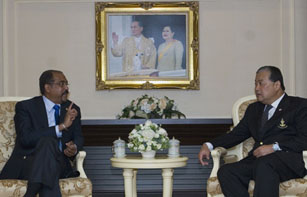
UNAIDS Executive Director Michel Sidibé (left) met with M.R. Sukhumbhand Paribatra, Governor of Bangkok, on 16 February at the Bangkok Metropolitan Administration City Hall. Credit: UNAIDS/V. Dithajohn
In an official mission this week to Thailand, UNAIDS Executive Director Michel Sidibé held discussions with M.R. Sukhumbhand Paribatra, Governor of Bangkok, on progress, challenges and opportunities for the AIDS response in the Thai capital. During the meeting, Mr Sidibé asked for increased support to help make Bangkok the first city to reach the goal of "zero new HIV infections."
Acknowledging the specific challenges faced by mega-cities in Asia—where new HIV infection rates among some key populations, including men who have sex with men, remain high and where migration is a complex daily reality—Mr Sidibé urged the Governor to play an active role in the June 2011 UN General Assembly High-Level Meeting on AIDS with other high-level city officials from mega-cities around the world. "This would be a perfect opportunity to tell the world that Bangkok is committed to getting to zero," said Mr Sidibé.
This would be a perfect opportunity to tell the world that Bangkok is committed to getting to zero
Michel Sidibé, UNAIDS Executive Director
In his discussions with Mr Sidibé, Governor Paribatra said that a focus on marginalized populations, particularly migrants, is critical to effective AIDS responses in Bangkok. While underscoring the complexity of city-based approaches to the HIV epidemic, he stressed his intention to rise to the challenge of "zero new HIV infections" in the Thai capital. Governor Paribatra expressed interest in attending the High-Level Meeting in June and in addition hosting a "getting to zero" gathering of officials from other mega-cities in the region during his term.

Feature Story
UNAIDS International Goodwill Ambassador Toumani Diabaté wins GRAMMY Award
16 February 2011
16 February 2011 16 February 2011
UNAIDS International Goodwill Ambassador Toumani Diabaté Credit: Malik Sidibé
UNAIDS International Goodwill Ambassador Toumani Diabaté received a GRAMMY award for best traditional world music album for his joint album with Ali Farka Toure's entitled “Ali and Toumani”.
The album is a recording of duets from two of Africa’s most distinguished musicians, the late guitarist Ali Farka Touré and kora player Toumani Diabaté. The duo’s first album together, also won a GRAMMY following its 2005 release.
At the 53rd GRAMMY Award ceremony, which took place in Los Angeles on 13 February, Vieux Farka Toure accepted the Award on behalf of his late father, Ali Farka Toure, and Toumani Diabaté.
Toumani was appointed UNAIDS International Goodwill Ambassador on 12 December 2008. He uses music as a tool to reach out to people with important messages on HIV prevention and educating his audiences about stigma and discrimination. Today, his music encourages the empowerment of people and spreads AIDS awareness messages in Mali and overseas.
Toumani descends from a long line of oral historians and singers. He has blended ancient West African music tradition with other modern and traditional music from across the world and been instrumental in introducing the kora, a 21-string harp lute, to audiences around the world and in developing it into a solo concert instrument.

Feature Story
UNAIDS applauds longstanding leadership of HRH Princess Soamsawali in Thailand’s HIV response
15 February 2011
15 February 2011 15 February 2011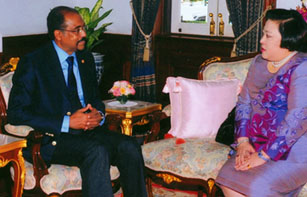
In an official visit to the Suan Kalub Palace in Bangkok, UNAIDS Executive Director Michel Sidibé met with HRH Princess Soamsawali of Thailand.
In an official visit to the Suan Kalub Palace in Bangkok on Monday, UNAIDS Executive Director Michel Sidibé commended HRH Princess Soamsawali of Thailand for her “tireless dedication, commitment and leadership” in the country’s HIV response.
“Through deeds, words and provision of resources where they are most needed, Your Royal Highness has shown true vision and commitment on HIV,” said Mr Sidibé, who is currently in Thailand on a three-day country mission. “I look forward to our ongoing collaboration to save and improve lives,” he added.
Presenting the Princess with a commemorative plaque for her ongoing efforts to prevent mother-to-child transmission of HIV (PMTCT) and HIV-related stigma and discrimination, Mr Sidibé noted Princess Soamsawali’s longstanding involvement in the HIV response, which dates back some 25 years.
Through her patronage of the Thai Red Cross, HRH Princess Soamsawali helped bring PMTCT services to Thailand in 1996, several years before a PMTCT programme was introduced as part of Thailand’s national response to the HIV epidemic. Within the programme, triple antiretroviral therapy is made available for all pregnant women living with HIV, independent of their CD4 count.
I would like to see Bangkok free of HIV. This means greater action is needed to break down barriers to ensure support is given to those who need it most
UNAIDS Executive Director Michel Sidibé
During their meeting, UNAIDS Executive Director and HRH Princess Soamsawali emphasized the importance of ensuring access to HIV programmes for marginalized populations and those at higher risk of HIV exposure—particularly men who have sex with men and illegal migrants.
While noting progress in Thailand’s HIV response, the Executive Director highlighted that more needs to be done. An estimated 530 000 people in Thailand are living with HIV and prevalence of the virus among people aged 15-49 is 1.3%.
“I would like to see Bangkok free of HIV,” said Mr Sidibé. “This means greater action is needed to break down barriers to ensure support is given to those who need it most,” he said. HIV programmes supported by HRH Princess Soamsawali provide antiretroviral treatment to marginalized populations, and the Princess underlined that her support in this area would continue.
Mr Sidibé’s official visit to Thailand, which ends on 17 February, includes a number of meetings with high-level government officials and representatives from civil society organizations.

Feature Story
Official visit to Berlin for meetings with Minister of Foreign Affairs and Vice-Chancellor, and Minister of Health
09 February 2011
09 February 2011 09 February 2011
UNAIDS Executive Director Michel Sidibé met with a number of German ministers and parliamentarians on 8 February, including Dr Philipp Rösler, Germany’s Minister of Health.
UNAIDS Executive Director Michel Sidibé held discussions with the German government on Tuesday on the future of the global AIDS response and asked for its continued support to keep HIV on the international development agenda.
In meetings with Guido Westerwelle, Germany’s Minister of Foreign Affairs and Vice Chancellor, and Dr Philipp Rösler, the Minister of Health, Mr Sidibé called on Germany to maintain its investments in AIDS. He also urged the country to play an active role in the June 2011 UN General Assembly High-Level Meeting on AIDS, ensuring participation at the highest possible level from a range of ministries. Dr Rösler and Mr Westerwelle, in turn, expressed their interest in attending the meeting.
Mr Sidibé shared with the German Ministers his concern over the growing HIV epidemic in Eastern Europe and encouraged Germany to expand its support to this region. Between 2000 and 2009, the number of people living with HIV in Eastern Europe and Central Asia nearly tripled—from an estimated 530 000 to 1.4 million. The Russian Federation and Ukraine together account for nearly 90% of newly reported HIV infections.
While in Berlin, Mr Sidibé also met with a number of members of German parliament, including Gudrun Kopp, Parliamentary State Secretary at the Ministry for Economic Cooperation and Development, and Annette Widmann-Mauz, Parliamentary State Secretary at the Ministry of Health. He briefed the parliamentarians on the status of the global HIV epidemic, the High-Level Meeting in June and UNAIDS’ strategy for the period 2011-2015.
In his discussions with German officials on Tuesday, Mr Sidibé raised a number of other topics, including access to HIV prevention for populations at higher risk of HIV exposure—such as men who have sex with men, sex workers, transgender people, and people who inject drugs. He stressed the importance of ensuring that trade agreements do not pose an obstacle to sustained access to AIDS treatment. Mr Sidibé also highlighted that AIDS funding is a shared responsibility, requiring increased and predictable investments from both donor governments and developing countries.
In 2009, Germany invested nearly US $398 million in the global AIDS response—the third largest contribution from a donor government after the United States and the United Kingdom.
Related

Feature Story
Judicial officials convene in Dakar for consultation on HIV, the law and human rights
08 February 2011
08 February 2011 08 February 2011
On 7 February, UNAIDS Executive Director Michel Sidibé spoke at the opening ceremony of a high-level consultation on HIV, the law and human rights in Dakar, Senegal.
Ministers of Justice and judges from across West and Central Africa gathered on 6-8 February in Dakar, Senegal, for a high-level consultation on HIV, the law and human rights. The meeting aimed to increase the engagement of judicial officials in the HIV response at national levels.
Eighty percent of countries in West and Central Africa have laws that criminalize HIV transmission, same-sex relations or sex work. Across the region, people living with HIV experience widespread stigma and discrimination in access to employment, education, health and social services. In many countries, people living with HIV and key populations at higher risk of HIV exposure—including sex workers and men who have sex with men—have limited access to legal support when injustices are committed.
“Laws should work for the AIDS response, not against it—they should never obstruct the health or survival of any individual,” said UNAIDS Executive Director Michel Sidibé, in his opening remarks at the consultation. “We must truly address discrimination and injustice related to AIDS,” he added. Mr Sidibé urged justice ministers to base their laws on science and ensure that all people have equal access to HIV prevention, treatment, care and support.
“We can no longer ignore the law as a means of combating HIV,” said Senegal’s Minister of Justice, Cheikh Tidiane Sy, noting that the epidemic had generated complex legal and human rights issues in the jurisprudence of countries across the region. Mr Sy underscored that judicial officials should not be limited to rendering decisions in a court of law. “It is equally important that magistrates involve themselves in activities that will increase legal knowledge among populations and ensure that they have access to justice,” he said.
The consultation—organized by the Joint United Nations Programme on HIV/AIDS (UNAIDS), the United Nations Development Programme (UNDP), the African Association of Highest Francophone Jurisdictions (AA-HJF) and the Office of the High Commissioner for Human Rights (OHCHR)—offered an opportunity for discussion on a range of HIV-related judgements, legal instruments and country-level initiatives. The meeting also provided a forum for individuals directly impacted by HIV-related laws, including people living with HIV, to share their experiences and perspectives.
Laws should work for the AIDS response, not against it—they should never obstruct the health or survival of any individual
UNAIDS Executive Director Michel Sidibé
Speaking to meeting participants on Sunday, Jeanne Gapiya Niyonzima, an HIV-positive woman and President of the Burundian Association of People Living with HIV, recalled how her doctor immediately ordered the termination of her pregnancy and removal of her uterus after she tested positive for HIV. “As magistrates, you can appreciate the gravity of this kind of assault on the physical and social integrity of a human being,” said Ms Niyonzima. “If we fail to provide a conducive social and legal environment, we risk losing all gains in the HIV response,” she added.
Judicial officials can play a critical role in protecting human rights and pushing forward the HIV response. In Burkina Faso, for example, where an estimated 1.2% of the adult population is living with HIV, the UNDP-led Programme d’appui au monde associatif et communautaire (PAMAC) is collaborating with other non-profit organizations and David Kaboré—a judge and human rights defender—on a legal literacy project to promote and safeguard the rights of people living with HIV. Launched in 2003, the project offers free and confidential legal advice to people living with HIV and has been instrumental in highlighting and addressing cases of HIV-related discrimination in the country.
Many countries around the world continue to have laws or policies that undermine HIV responses and punish, rather than protect, people in need. Seventy-nine countries criminalize same-sex relations between consenting adults. More than 100 countries, territories and areas criminalize some aspect of sex work. And 48 countries, territories or entities impose some form of restriction on the entry, stay or residence of HIV-positive people based on their HIV status.
UNAIDS advocates for protective laws and measures to ensure that all people in need benefit from HIV programmes and have access to justice, regardless of health status, gender, sexual orientation, drug use or sex work.
Last year, UNAIDS and UNDP launched the Global Commission on HIV and the Law, bringing together public leaders from many walks of life and regions, as well as experts in law, human rights and HIV. The UNDP-led Commission is working to ensure that laws support effective AIDS responses.






